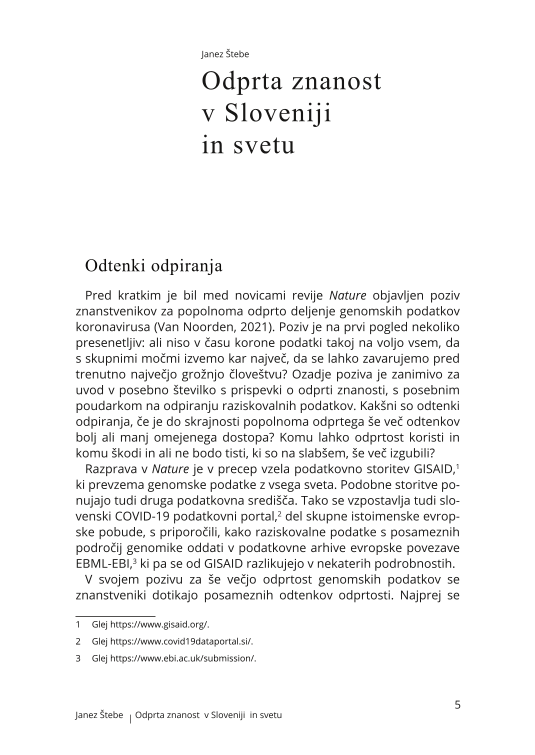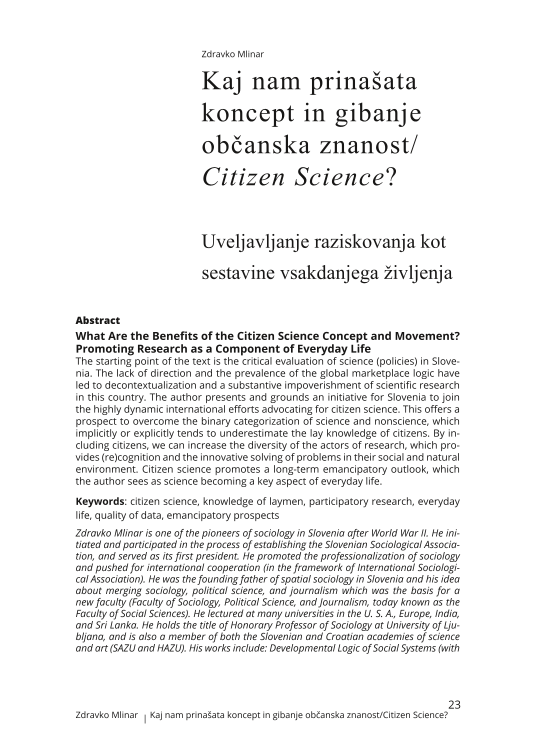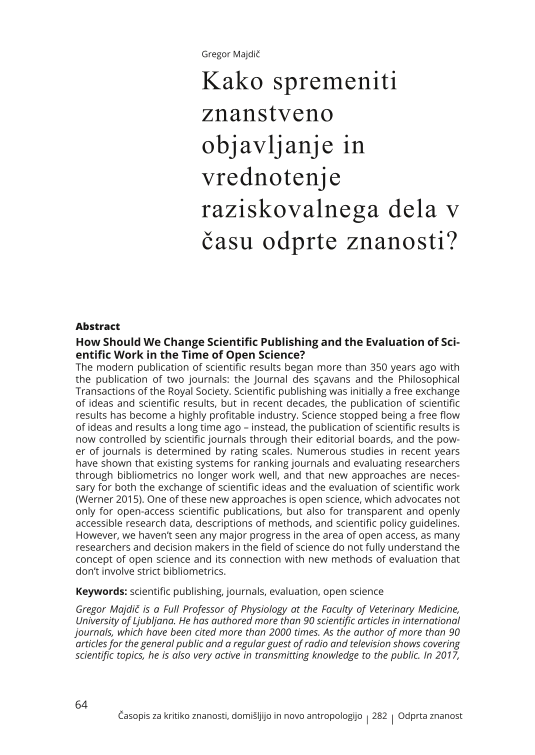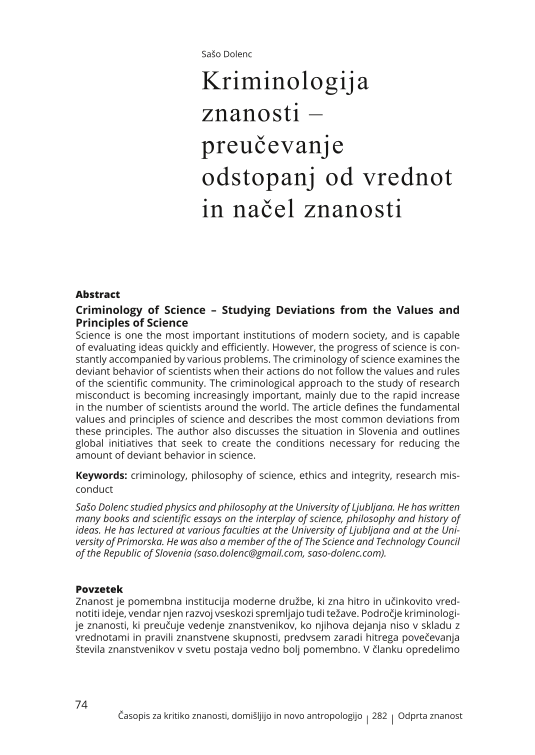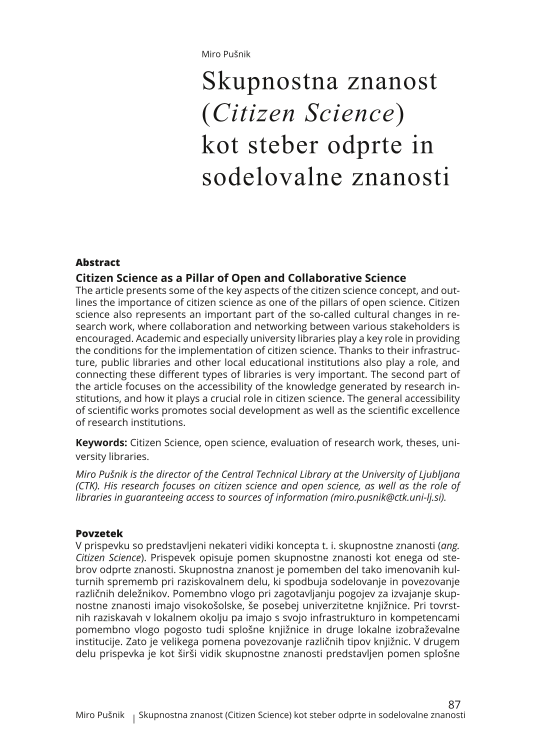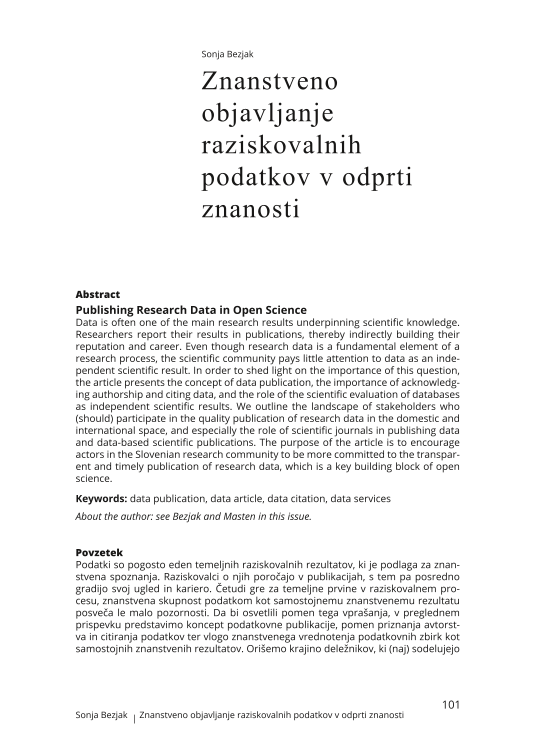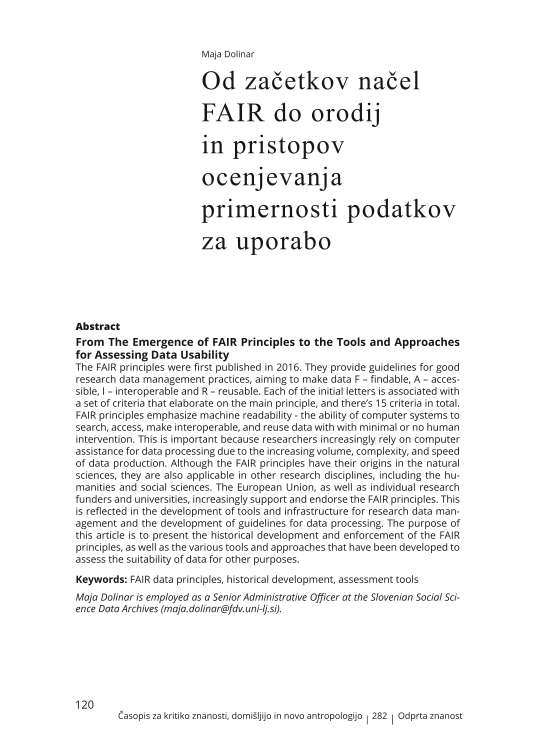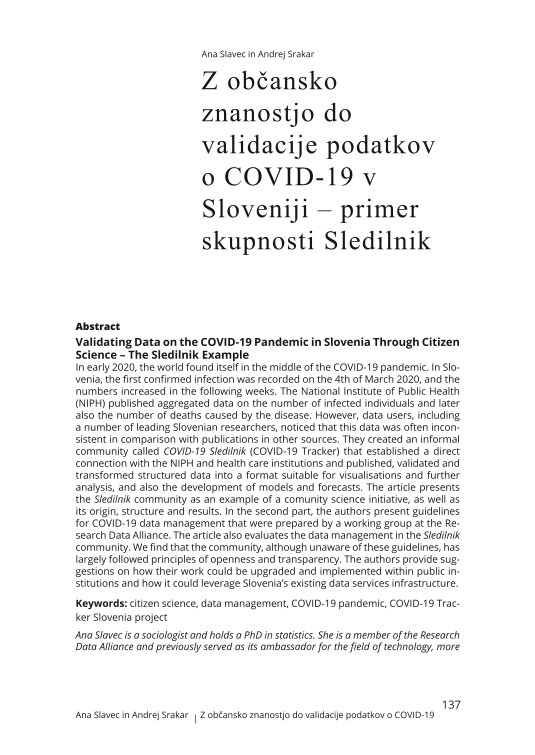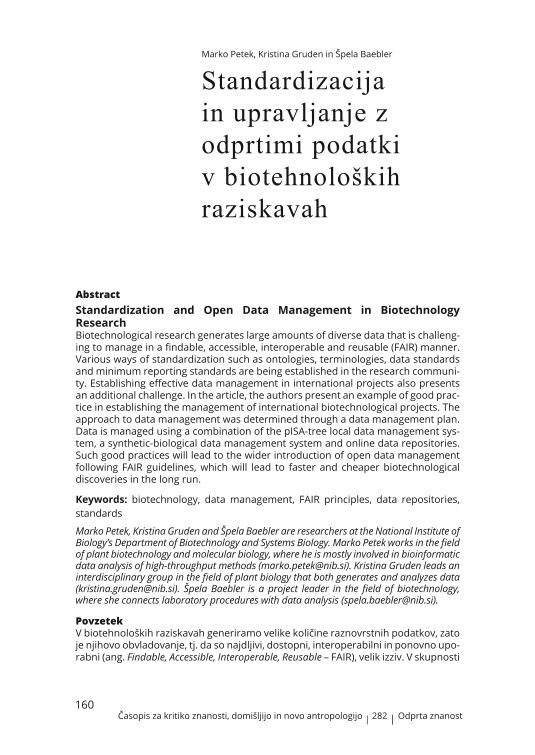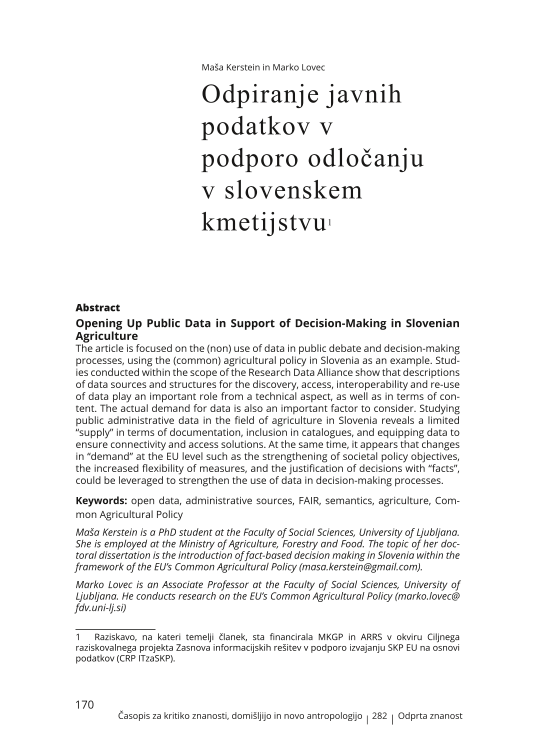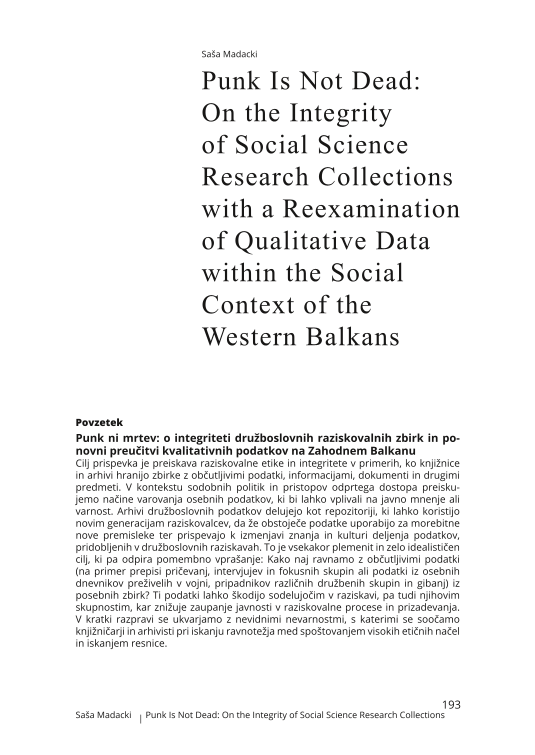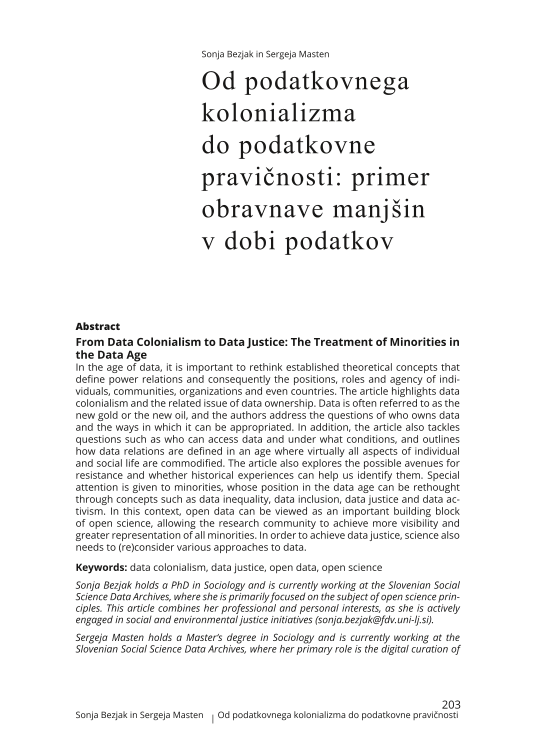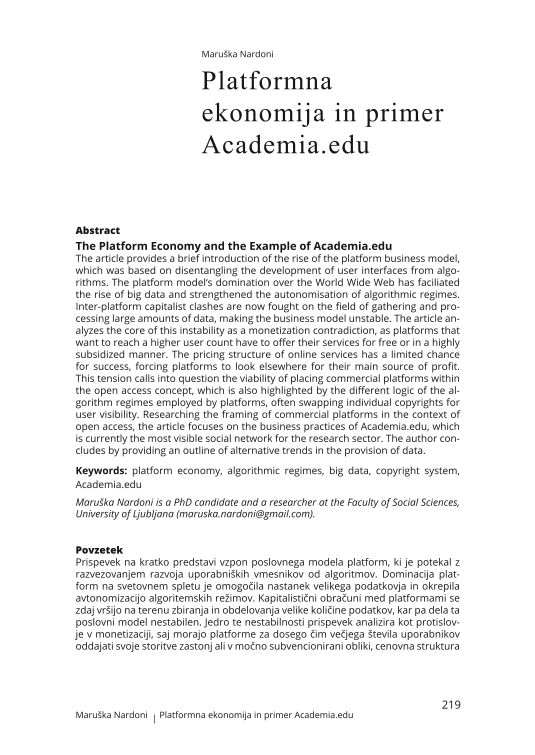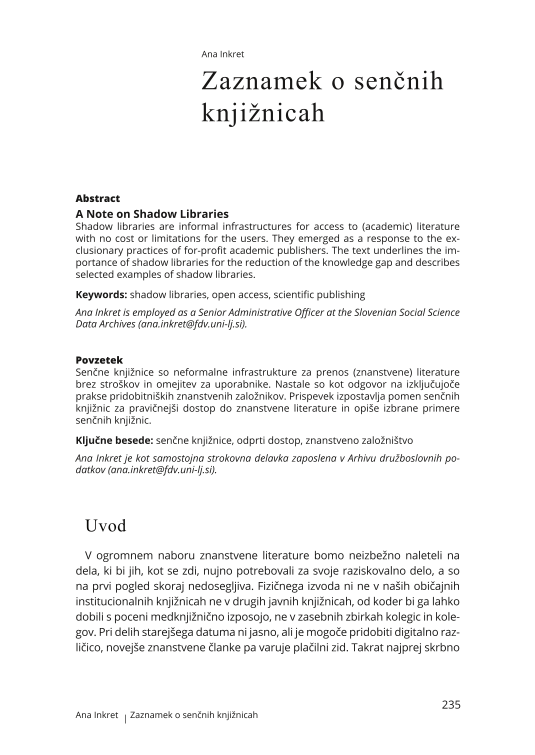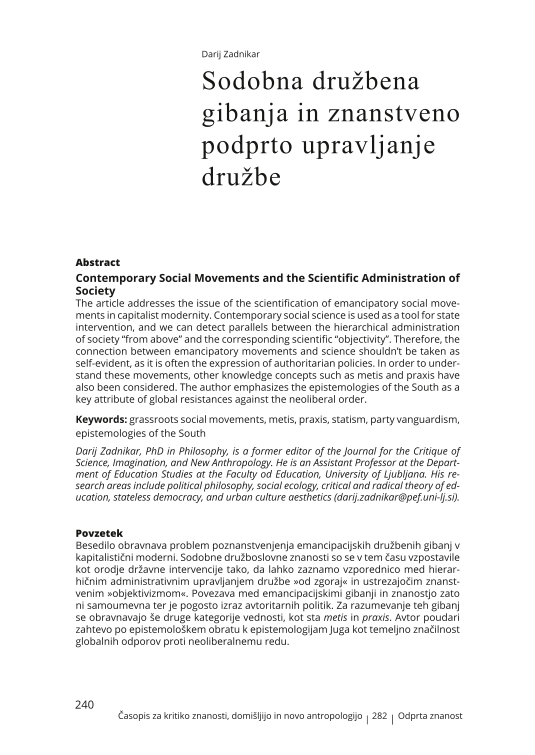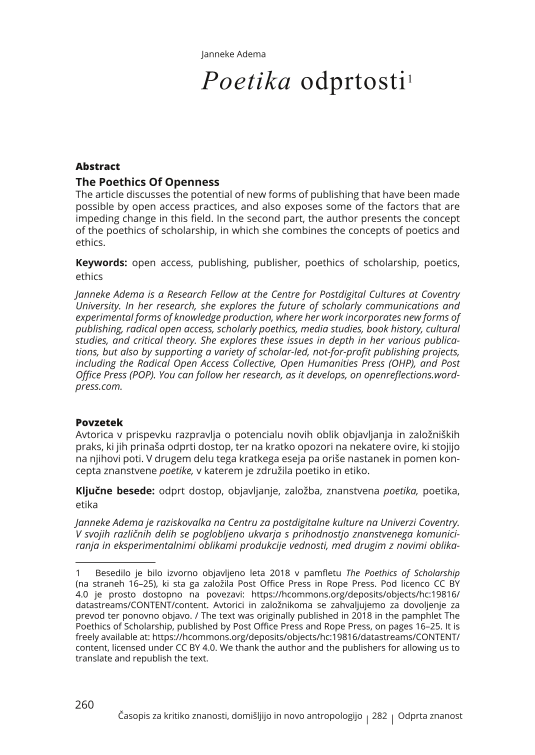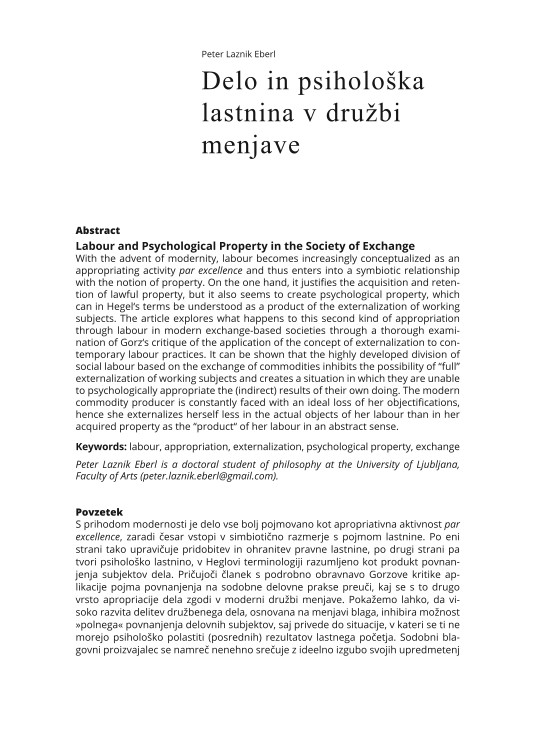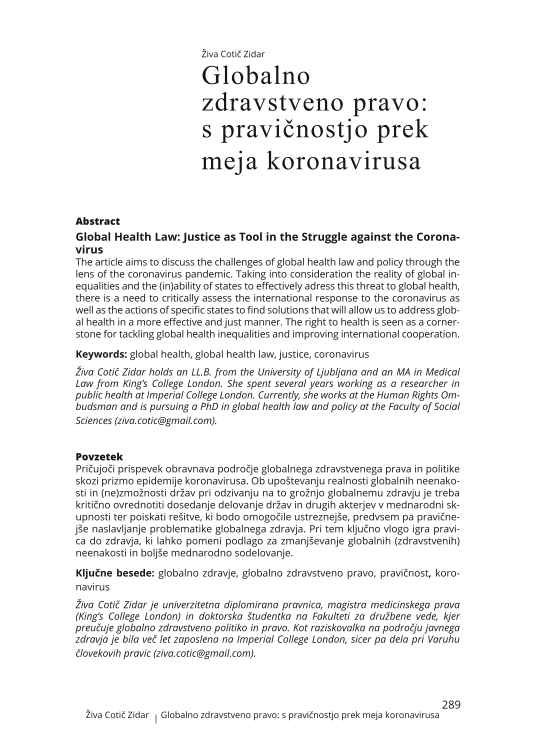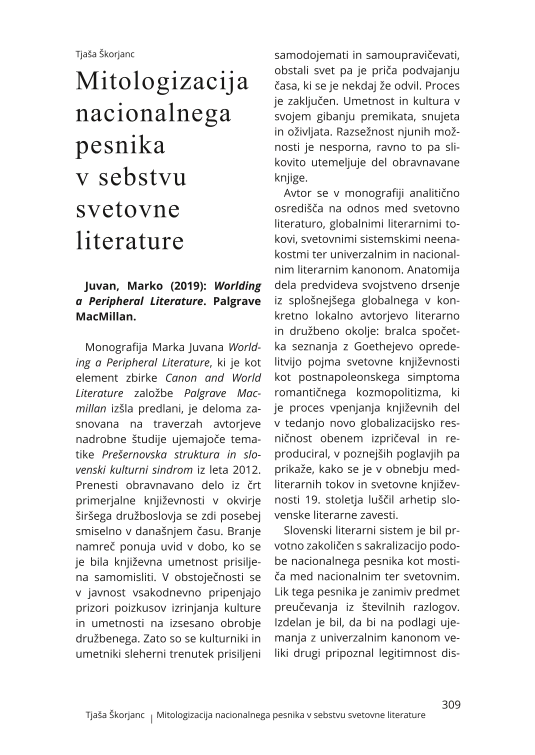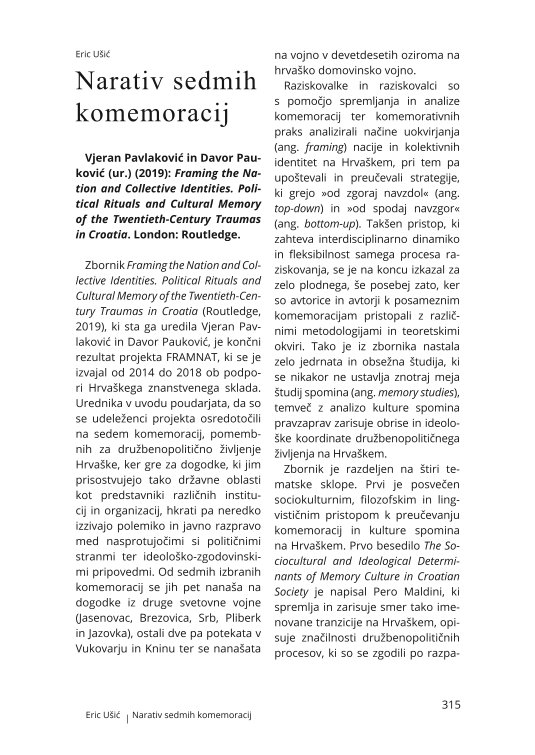Odtenki odpiranja
Pred kratkim je bil med novicami revije Nature objavljen poziv znanstvenikov za popolnoma odprto deljenje genomskih podatkov koronavirusa (Van Noorden, 2021). Poziv je na prvi pogled nekoliko presenetljiv: ali niso v času korone podatki takoj na voljo vsem, da s skupnimi močmi izvemo kar največ, da se lahko zavarujemo pred trenutno največjo grožnjo človeštvu? Ozadje poziva je zanimivo za uvod v posebno številko s prispevki o odprti znanosti, s posebnim poudarkom na odpiranju raziskovalnih podatkov. Kakšni so odtenki odpiranja, če je do skrajnosti popolnoma odprtega še več odtenkov bolj ali manj omejenega dostopa? Komu lahko odprtost koristi in komu škodi in ali ne bodo tisti, ki so na slabšem, še več izgubili?
The starting point of the text is the critical evaluation of science (policies) in Slovenia. The lack of direction and the prevalence of the global marketplace logic have led to decontextualization and a substantive impoverishment of scientific research in this country. The author presents and grounds an initiative for Slovenia to join the highly dynamic international efforts advocating for citizen science. This offers a prospect to overcome the binary categorization of science and nonscience, which implicitly or explicitly tends to underestimate the lay knowledge of citizens. By including citizens, we can increase the diversity of the actors of research, which provides (re)cognition and the innovative solving of problems in their social and natural environment. Citizen science promotes a long-term emancipatory outlook, which the author sees as science becoming a key aspect of everyday life.
The modern publication of scientific results began more than 350 years ago with the publication of two journals: the Journal des sçavans and the Philosophical Transactions of the Royal Society. Scientific publishing was initially a free exchange of ideas and scientific results, but in recent decades, the publication of scientific results has become a highly profitable industry. Science stopped being a free flow of ideas and results a long time ago – instead, the publication of scientific results is now controlled by scientific journals through their editorial boards, and the power of journals is determined by rating scales. Numerous studies in recent years have shown that existing systems for ranking journals and evaluating researchers through bibliometrics no longer work well, and that new approaches are necessary for both the exchange of scientific ideas and the evaluation of scientific work (Werner 2015). One of these new approaches is open science, which advocates not only for open-access scientific publications, but also for transparent and openly accessible research data, descriptions of methods, and scientific policy guidelines. However, we haven’t seen any major progress in the area of open access, as many researchers and decision makers in the field of science do not fully understand the concept of open science and its connection with new methods of evaluation that don’t involve strict bibliometrics.
Science is one the most important institutions of modern society, and is capable of evaluating ideas quickly and efficiently. However, the progress of science is constantly accompanied by various problems. The criminology of science examines the deviant behavior of scientists when their actions do not follow the values and rules of the scientific community. The criminological approach to the study of research misconduct is becoming increasingly important, mainly due to the rapid increase in the number of scientists around the world. The article defines the fundamental values and principles of science and describes the most common deviations from these principles. The author also discusses the situation in Slovenia and outlines global initiatives that seek to create the conditions necessary for reducing the amount of deviant behavior in science.
The article presents some of the key aspects of the citizen science concept, and outlines the importance of citizen science as one of the pillars of open science. Citizen science also represents an important part of the so-called cultural changes in research work, where collaboration and networking between various stakeholders is encouraged. Academic and especially university libraries play a key role in providing the conditions for the implementation of citizen science. Thanks to their infrastructure, public libraries and other local educational institutions also play a role, and connecting these different types of libraries is very important. The second part of the article focuses on the accessibility of the knowledge generated by research institutions, and how it plays a crucial role in citizen science. The general accessibility of scientific works promotes social development as well as the scientific excellence of research institutions.
Data is often one of the main research results underpinning scientific knowledge. Researchers report their results in publications, thereby indirectly building their reputation and career. Even though research data is a fundamental element of a research process, the scientific community pays little attention to data as an independent scientific result. In order to shed light on the importance of this question, the article presents the concept of data publication, the importance of acknowledging authorship and citing data, and the role of the scientific evaluation of databases as independent scientific results. We outline the landscape of stakeholders who (should) participate in the quality publication of research data in the domestic and international space, and especially the role of scientific journals in publishing data and data-based scientific publications. The purpose of the article is to encourage actors in the Slovenian research community to be more committed to the transparent and timely publication of research data, which is a key building block of open science.
From The Emergence of FAIR Principles to the Tools and Approaches for Assessing Data Usability
(
The FAIR principles were first published in 2016. They provide guidelines for good research data management practices, aiming to make data F – findable, A – accessible, I – interoperable and R – reusable. Each of the initial letters is associated with a set of criteria that elaborate on the main principle, and there’s 15 criteria in total. FAIR principles emphasize machine readability -the ability of computer systems to search, access, make interoperable, and reuse data with with minimal or no human intervention. This is important because researchers increasingly rely on computer assistance for data processing due to the increasing volume, complexity, and speed of data production. Although the FAIR principles have their origins in the natural sciences, they are also applicable in other research disciplines, including the humanities and social sciences. The European Union, as well as individual research funders and universities, increasingly support and endorse the FAIR principles. This is reflected in the development of tools and infrastructure for research data management and the development of guidelines for data processing. The purpose of this article is to present the historical development and enforcement of the FAIR principles, as well as the various tools and approaches that have been developed to assess the suitability of data for other purposes.
Validating Data on the COVID-19 Pandemic in Slovenia Through Citizen Science – The Sledilnik Example
(
In early 2020, the world found itself in the middle of the COVID-19 pandemic. In Slovenia, the first confirmed infection was recorded on the 4th of March 2020, and the numbers increased in the following weeks. The National Institute of Public Health (NIPH) published aggregated data on the number of infected individuals and later also the number of deaths caused by the disease. However, data users, including a number of leading Slovenian researchers, noticed that this data was often inconsistent in comparison with publications in other sources. They created an informal community called COVID-19 Sledilnik (COVID-19 Tracker) that established a direct connection with the NIPH and health care institutions and published, validated and transformed structured data into a format suitable for visualisations and further analysis, and also the development of models and forecasts. The article presents the Sledilnik community as an example of a comunity science initiative, as well as its origin, structure and results. In the second part, the authors present guidelines for COVID-19 data management that were prepared by a working group at the Research Data Alliance. The article also evaluates the data management in the Sledilnik community. We find that the community, although unaware of these guidelines, has largely followed principles of openness and transparency. The authors provide suggestions on how their work could be upgraded and implemented within public institutions and how it could leverage Slovenia’s existing data services infrastructure.
Biotechnological research generates large amounts of diverse data that is challenging to manage in a findable, accessible, interoperable and reusable (FAIR) manner. Various ways of standardization such as ontologies, terminologies, data standards and minimum reporting standards are being established in the research community. Establishing effective data management in international projects also presents an additional challenge. In the article, the authors present an example of good practice in establishing the management of international biotechnological projects. The approach to data management was determined through a data management plan. Data is managed using a combination of the pISA-tree local data management system, a synthetic-biological data management system and online data repositories. Such good practices will lead to the wider introduction of open data management following FAIR guidelines, which will lead to faster and cheaper biotechnological discoveries in the long run.
The article is focused on the (non) use of data in public debate and decision-making processes, using the (common) agricultural policy in Slovenia as an example. Studies conducted within the scope of the Research Data Alliance show that descriptions of data sources and structures for the discovery, access, interoperability and re-use of data play an important role from a technical aspect, as well as in terms of content. The actual demand for data is also an important factor to consider. Studying public administrative data in the field of agriculture in Slovenia reveals a limited “supply” in terms of documentation, inclusion in catalogues, and equipping data to ensure connectivity and access solutions. At the same time, it appears that changes in “demand” at the EU level such as the strengthening of societal policy objectives, the increased flexibility of measures, and the justification of decisions with “facts”, could be leveraged to strengthen the use of data in decision-making processes.
The aim of this paper is to examine the ethical integrity of research when sensitive data, information, documents and other artefacts become stored within collections held by libraries and archives. Further, we are going to explore some possible paths for the protection of personal data, which may affect public opinion or public security in the context of contemporary open access policies and approaches. Social science data archives aim to be repositories of research data intended to be used by “new generations of researchers” to reinterpret “old” data with possible new insights, enhancing the exchange of knowledge and sharing of data collected through research in the social sciences. A noble and profoundly idealistic goal, without any doubt. However, the important question is, how should we treat sensitive qualitative data, e.g., transcripts of testimonies, interviews, and focus groups or personal diaries of war survivors, members of various social groups and movements, that are deposited in special collections? These are data which have the power to harm the very same individuals who agreed to be participants in the research process, as well as the entire communities from which they stem, and in so doing lower the public trust in research policies and efforts. Within this short discussion, we explore the hidden dangers which librarians and archivists have to overcome in order to both make sure that high ethical principles continue to be strived for while at the same time never compromising the everlasting quest for the truth.
In the age of data, it is important to rethink established theoretical concepts that define power relations and consequently the positions, roles and agency of individuals, communities, organizations and even countries. The article highlights data colonialism and the related issue of data ownership. Data is often referred to as the new gold or the new oil, and the authors address the questions of who owns data and the ways in which it can be appropriated. In addition, the article also tackles questions such as who can access data and under what conditions, and outlines how data relations are defined in an age where virtually all aspects of individual and social life are commodified. The article also explores the possible avenues for resistance and whether historical experiences can help us identify them. Special attention is given to minorities, whose position in the data age can be rethought through concepts such as data inequality, data inclusion, data justice and data activism. In this context, open data can be viewed as an important building block of open science, allowing the research community to achieve more visibility and greater representation of all minorities. In order to achieve data justice, science also needs to (re)consider various approaches to data.
The article provides a brief introduction of the rise of the platform business model, which was based on disentangling the development of user interfaces from algorithms. The platform model‘s domination over the World Wide Web has faciliated the rise of big data and strengthened the autonomisation of algorithmic regimes. Inter-platform capitalist clashes are now fought on the field of gathering and processing large amounts of data, making the business model unstable. The article analyzes the core of this instability as a monetization contradiction, as platforms that want to reach a higher user count have to offer their services for free or in a highly subsidized manner. The pricing structure of online services has a limited chance for success, forcing platforms to look elsewhere for their main source of profit. This tension calls into question the viability of placing commercial platforms within the open access concept, which is also highlighted by the different logic of the algorithm regimes employed by platforms, often swapping individual copyrights for user visibility. Researching the framing of commercial platforms in the context of open access, the article focuses on the business practices of Academia.edu, which is currently the most visible social network for the research sector. The author concludes by providing an outline of alternative trends in the provision of data.
Shadow libraries are informal infrastructures for access to (academic) literature with no cost or limitations for the users. They emerged as a response to the exclusionary practices of for-profit academic publishers. The text underlines the importance of shadow libraries for the reduction of the knowledge gap and describes selected examples of shadow libraries.
The article addresses the issue of the scientification of emancipatory social movements in capitalist modernity. Contemporary social science is used as a tool for state intervention, and we can detect parallels between the hierarchical administration of society “from above” and the corresponding scientific “objectivity”. Therefore, the connection between emancipatory movements and science shouldn’t be taken as self-evident, as it is often the expression of authoritarian policies. In order to understand these movements, other knowledge concepts such as metis and praxis have also been considered. The author emphasizes the epistemologies of the South as a key attribute of global resistances against the neoliberal order.
The article discusses the potential of new forms of publishing that have been made possible by open access practices, and also exposes some of the factors that are impeding change in this field. In the second part, the author presents the concept of the poethics of scholarship, in which she combines the concepts of poetics and ethics.
With the advent of modernity, labour becomes increasingly conceptualized as an appropriating activity par excellence and thus enters into a symbiotic relationship with the notion of property. On the one hand, it justifies the acquisition and retention of lawful property, but it also seems to create psychological property, which can in Hegel‘s terms be understood as a product of the externalization of working subjects. The article explores what happens to this second kind of appropriation through labour in modern exchange-based societies through a thorough examination of Gorz‘s critique of the application of the concept of externalization to contemporary labour practices. It can be shown that the highly developed division of social labour based on the exchange of commodities inhibits the possibility of “full” externalization of working subjects and creates a situation in which they are unable to psychologically appropriate the (indirect) results of their own doing. The modern commodity producer is constantly faced with an ideal loss of her objectifications, hence she externalizes herself less in the actual objects of her labour than in her acquired property as the “product“ of her labour in an abstract sense.
The article aims to discuss the challenges of global health law and policy through the lens of the coronavirus pandemic. Taking into consideration the reality of global inequalities and the (in)ability of states to effectively adress this threat to global health, there is a need to critically assess the international response to the coronavirus as well as the actions of specific states to find solutions that will allow us to address global health in a more effective and just manner. The right to health is seen as a cornerstone for tackling global health inequalities and improving international cooperation.
Juvan, Marko (2019): Worlding a Peripheral Literature. Palgrave MacMillan.
Monografija Marka Juvana Worlding a Peripheral Literature, ki je kot element zbirke Canon and World Literature založbe Palgrave Macmillan izšla predlani, je deloma zasnovana na traverzah avtorjeve nadrobne študije ujemajoče tematike Prešernovska struktura in slovenski kulturni sindrom iz leta 2012. Prenesti obravnavano delo iz črt primerjalne književnosti v okvirje širšega družboslovja se zdi posebej smiselno v današnjem času. Branje namreč ponuja uvid v dobo, ko se je bila književna umetnost prisiljena samomisliti. V obstoječnosti se v javnost vsakodnevno pripenjajo prizori poizkusov izrinjanja kulture in umetnosti na izsesano obrobje družbenega. Zato so se kulturniki in umetniki sleherni trenutek prisiljeni samodojemati in samoupravičevati, obstali svet pa je priča podvajanju časa, ki se je nekdaj že odvil. Proces je zaključen. Umetnost in kultura v svojem gibanju premikata, snujeta in oživljata. Razsežnost njunih možnosti je nesporna, ravno to pa slikovito utemeljuje del obravnavane knjige.
Vjeran Pavlaković in Davor Pauković (ur.) (2019): Framing the Nation and Collective Identities. Political Rituals and Cultural Memory of the Twentieth-Century Traumas in Croatia. London: Routledge.
Zbornik Framing the Nation and Collective Identities. Political Rituals and Cultural Memory of the Twentieth-Century Traumas in Croatia (Routledge, 2019), ki sta ga uredila Vjeran Pavlaković in Davor Pauković, je končni rezultat projekta FRAMNAT, ki se je izvajal od 2014 do 2018 ob podpori Hrvaškega znanstvenega sklada. Urednika v uvodu poudarjata, da so se udeleženci projekta osredotočili na sedem komemoracij, pomembnih za družbenopolitično življenje Hrvaške, ker gre za dogodke, ki jim prisostvujejo tako državne oblasti kot predstavniki različnih institucij in organizacij, hkrati pa neredko izzivajo polemiko in javno razpravo med nasprotujočimi si političnimi stranmi ter ideološko-zgodovinskimi pripovedmi. Od sedmih izbranih komemoracij se jih pet nanaša na dogodke iz druge svetovne vojne (Jasenovac, Brezovica, Srb, Pliberk in Jazovka), ostali dve pa potekata v Vukovarju in Kninu ter se nanašata na vojno v devetdesetih oziroma na hrvaško domovinsko vojno.




